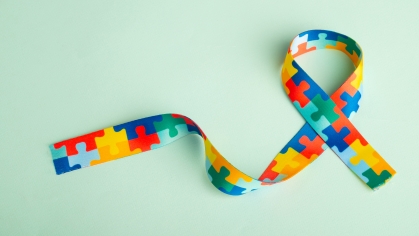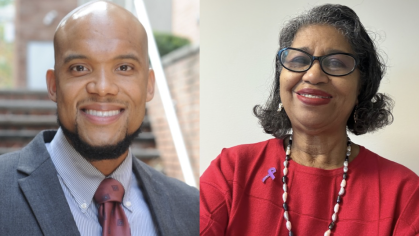Jamey Lister, PhD, MSW is an Associate Professor at Rutgers School of Social Work. He serves as the Co-Director and New Jersey Director of the Northeast & Caribbean Rural Opioid Technical Assistance Center, as well as the Director of the Division for Rural and Underserved Health within the Center for Prevention Science at Rutgers School of Social Work.
Tell us a bit about your journey to social work.
My journey felt like a wandering one, more like a prize drop game where my ball eventually landed in the social work slot. Growing up, the people I knew who pursued higher education primarily had degrees in nursing or teaching. While I had good grades in high school, I went to college mostly for athletics. I earned a scholarship, which kept cost affordable. Without that support, I am not sure I would have gone. As I realized my athletics career would end, I considered dropping out of college and working at a youth home, which was when I first heard about social work as a profession. To think that I would end up with a PhD was not something I envisioned or had a roadmap for, in large part because people from rural areas are underrepresented in higher education. I grew up in a rural and medically underserved area of Michigan, where most of my social network worked blue-collar jobs. That formative time helped me see how entrenched social determinants like economic stress, educational barriers, social isolation, and a lack of local health care are in the rural context. Further, those forces create disempowerment, mistrust of outsiders, and in the process, heighten risk for addiction, suicide and mental health challenges, chronic diseases, and interpersonal violence. As I got deeper into my social work career, my scholarly interests coalesced around the topics I knew best. Now it has come a bit full circle. My projects at Rutgers create and disseminate knowledge about addiction and health for underserved populations, with an aim to reduce barriers they face when accessing care. It is a value of mine that social workers provide services tailored to social, economic, and cultural needs and considerations.
What is the significance of National Recovery Month for you?
For me, National Recovery Month is a time for everyone who has been affected by substance use to learn more about what addiction is and is not. Recovery Month was first observed in 1989 and occurs every September. The month provides an opportunity to share information about recovery practices and evidence-based treatments for substance use and mental health. It also is a time to honor people, providers, and communities working to promote recovery. Given how widespread the addiction epidemic has been across communities within the United States, this month can speak to every member of our society in some fashion. Personally, I look forward to hearing stories from consumers and families who have dealt with addiction, as well as the healthcare providers, advocates, and researchers who offered services, support, and data-driven recommendations. It is also a time for policy makers and administrators to reflect on what is not working so new strategies can be designed and implemented. In 2023, treatment is still inaccessible, especially for people living in under-resourced communities. Policy and legal approaches, while less punitive than in years past, are still misaligned with the evidence showing a need to view addiction as a chronic, complex condition that requires more than willpower and abstinence approaches. Further, the literature continues to show that social workers and other health professionals must improve their level of compassion and stigma-free support when serving the substance use populations.
How can the social work community recognize and observe National Recovery Month?
Social workers can use this month to lead or join stigma reduction efforts, share knowledge about addiction that is grounded in research, and advocate for policy change to make access to care equitable across society. As a discipline, we also need to better recognize our responsibilities that are outlined by the NASW Code of Ethics. Despite our values to promote dignity and worth, and to be competent professionals, our discipline has only recently started to tackle the issue of substance use as a primary focus. Historically, we have looked at it more as a co-occurring issue that affects populations within our traditional areas of emphasis (e.g., child welfare, poverty, interpersonal violence). While those issues are important, we are in a situation where most social work curricula lack sophisticated coverage of substance use, and few social work leaders are trained on the subject. Meanwhile, we continue to be the most common health professionals to interface with substance use populations. As a result, social workers are often left to provide care without full competence. This frequently leads to decisions anchored in misconceptions and stigma about substance use. Ultimately, this undercuts our ability and desire to promote dignity and worth for clients. There are practical strategies for social workers interested in advancing our discipline, whether they’re new to addiction or looking to expand on their previous efforts. We need all the person power we can get!
What can the social work profession or social workers do to continue to support individuals affected by substance use beyond this month?
If I had to implement one recommendation for social work as a discipline, it would be for all social work programs to be required to deliver high-quality standardized substance use curriculum grounded in scientific evidence. The Council on Social Work Education received an award from the Substance Abuse and Mental Health Services Administration (SAMHSA) to pilot this type of curriculum, which involved a set of partnering universities. I’d love to see social work programs required to use this or other high-quality standardized curricula. While resources are needed to enact changes and barriers will exist when adapting curricula, as a discipline, we urgently need to raise the bar. Developing and monitoring success in meeting uniform standards is one way to mitigate outdated approaches or inattention to the issue of substance use. In the long term, this will ensure future social workers have the skills they need to best serve individuals, families, and communities as a whole. For social workers interested in these kinds of resources, Rutgers School of Social Work is a part of two SAMHSA funded centers that exist within a larger network of centers of excellence covering all of our country’s states and territories. These include the Caribbean Rural Opioid Technical Assistance Center and Northeast & Caribbean Prevention Technology Transfer Center.
This story was created in partnership with Rutgers School of Social Work's Inclusion, Intersectionality, Diversity, Equity, and Advancement (IIDEA) Committee.



